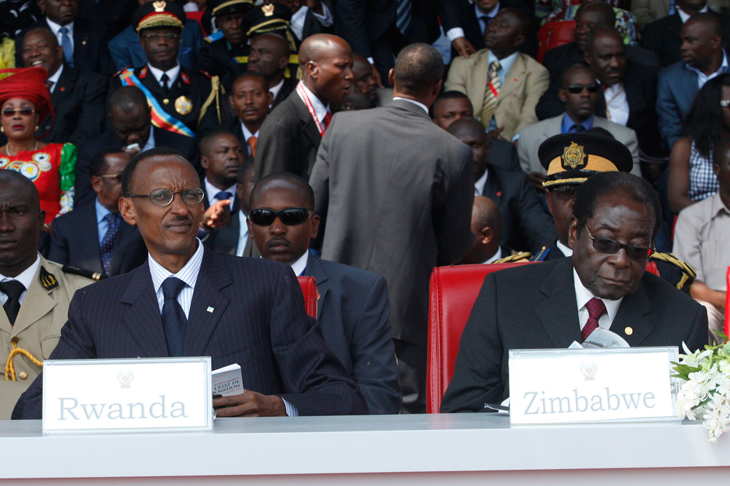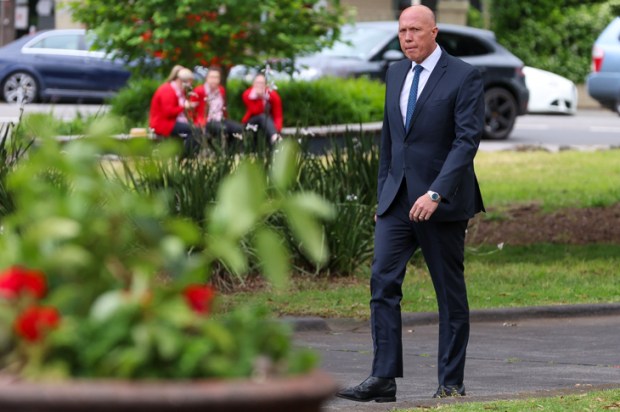Sometimes African rulers get so corrupt that Western aid donors go on strike. Take what Trump would call the shit-hole state of Malawi (please!).
Malawi relies on donors for 40 per cent of its spending. In 2013 a junior public servant was caught with cash bales of $US300,000 in his car boot. Raids on bureaucrats’ homes and car boots located more bales. Then someone shot the finance ministry’s budget director.
‘Cashgate’ travelled up to ministerial level, with initial allegations of a snaffled $US50m escalating to $US250m. The entire cabinet resigned. Normally-lavish donor Norway led a freezing of $US150m in aid, pending reforms.
Australian taxpayers’ despatched a bit over $A98m to Malawi in the past decade. Heck, round it to $100m. In the pre-scandal year we put in $23m. Was it coincidence that next year we halved it to $12m? All is forgiven because post-scandal we’ve given Malawi $46m-plus.
Aid ain’t transformative. Malawi’s signature accomplishment is breeding – 3 per cent annual population growth. In the five years to 2016, national income fell 11 per cent and income per head plummeted from $US440 to $US320. Schools are so useless that three-quarters of kids in sixth-grade primary can’t read. School incompetence is general, with countries typically wasting half their education budget on schooling by semi-literate teachers with national teacher absentee rates up to 42 per cent.
The 49 countries of sub-Saharan Africa (23 Islamic, including Malawi) are a bottomless pit for corruption and donors’ funds. OECD puts total aid in the five years 2012-2016 at $USD297 billion. Australia does its bit. The Department of Foreign Affairs and Trade (DFAT) totals our decade’s aid there (to 2018-19) at $A2.4 billion.
DFAT explains that Australia has a ‘clear national interest’ in the security, stability and prosperity of sub-Saharan Africa. Australia is developing good economic partnerships through targeted aid. Our strength is in our experience and expertise in human capacity building and the agriculture and extractive sectors.
But Western aid, alas, averages the same $US50 billion a year as $US50 billion-plus in ‘illicit outflows’ via politicians, officials, business people and criminals, a figure not disputed by the OECD. A pan-African study in 2013 put illicit outflows from 1980-2009 at $US1.2-1.4 trillion, again about equal to aid.
Most is in commerce. For example, Mozambique’s timber exporters were declaring 260,000 cubic metres of global exports when China alone was importing 450,000 cubic metres from Mozambique.
Guinea is rich in iron ore. One mine was reckoned good for $US7b annual exports for 20 years. In 2008 the Guinea government sold a multinational the mining rights for $US165m. The company promptly sold-on half its concession for $US2.5b. A successor government re-let the concession for $US20 billion, a far cry from the original $165m.
Africa’s resources-rich countries, tragically, are showing worse progress on welfare. Illiteracy rates are higher, life is shorter, women and children go hungrier and get beaten up more often.
It’s nasty stuff because any $US100m retained in the country could buy 100m malaria dosages or 10m treated bed nets, for example.
Even nastier: female genital mutilation rates. Here’s the top ten: Somalia 98 per cent; Guinea 96 per cent; Djibouti 95 per cent; Egypt 91 per cent; Eritrea and Mali 89 per cent; Sierra Leone and Sudan 88 per cent; Burkino Faso and Gambia, 76 per cent. All except Eritrea are Islamic states.
Here’s another little case study. Rwanda’s strongman President Paul Kagame is an Arsenal soccer fan. Last month he paid £30m ($A53m) for ‘Visit Rwanda’ to sponsor Arsenal. His clique can now enjoy perks like an Arsenal hospitality box. Rwanda also runs a loss-making airline that swallowed half a billion US dollars in government support from 2013-16. But 40 per cent live in squalor, 90 per cent have no electricity and it’s even rationed to hospitals. Teachers’ pay can lag five months.
Western donors give Rwanda about $US1b a year. The unhappy Brits’ contribution is about $US100m a year. In the past six years Australia gave $19m to Rwanda in official aid, equivalent to a third of Kagame’s payout to Arsenal.
Australia’s aid is now focused 90 per cent on what Julie Bishop re-assuringly calls the ‘Indo-Pacific’. But who’s ‘Indo-Pacific’? Answer: Pacific Islands – 10 including PNG; SEA and East Asia – eight countries including surprise entrant Mongolia; South and West Asia – eight countries including Nepal, Bhutan, Pakistan and the never-quite-drowning tourist mecca Maldives. And big surprise: African East Coast – Comoros, Kenya, Madagascar, Mauritius, Mozambique, Seychelles, Somalia, Tanzania and South Africa. Kenya by the way has a 27 per cent FGM rate and Tanzania 15 per cent.
This list of supplicants is broad indeed but not as broad as in the Rudd/Gillard era of your-cash-to-burn. In one year, 2011, we rained money on 48 of the 49 sub-Saharan states. That was Kevin Rudd’s strategy for a Security Council seat for 2013-2014.
Guinea-Bissau was the orphan with no grant. It’s not the worst in Africa (that’s Equatorial Guinea, a Christian state whose ruthless dictator has been in power for 38 years. His son in 2016 complained of a home burglary of 60 million euros). According to the US State Department, Islamic Guinea-Bissau features bureaucrats and the military topping up their salaries courtesy of international drug cartels, 45 per cent of the girls and women getting their genitals carved up, ‘wide-spread wife beating’, schools ‘only open intermittently due to strikes by teachers’ and girls being forced into prostitution if they reject arranged marriages. But countries almost as bad did get Kevin’s grants.
Our diplomats in five posts (58 staff) went crazy trying to ‘build relationships’ with scores of indifferent and unscrupulous African states. But in the most cost-effective last-minute gesture in diplomatic history, on General Assembly voting day our reps slipped each voter a Cadbury’s Caramello Koala. We won the poll.
While donors fret, sub-Sahara has become a population time-bomb, many countries gaining 3 per cent a year. Africa’s 1.26b could double to 2.53b by 2050, the UN projects, and nearly double again to 4.47b by 2100. The big feller is Nigeria, now 190m, but growing to 410m by 2050 and 794m by 2100. Currently Islamic forces in Nigeria are ‘ethnic cleansing’ Christian communities and Boko Haram is brutally suppressing girls’ education. (Australia’s decade of Nigerian aid: $48.5m).
Life expectancy below Sahara is 57, fourteen years under world average. In six countries you’re lucky to get forty years’ healthy life.
Across Africa 4 per cent are HIV victims, five times the global average and about forty times the rate in Australia. In South Africa, WHO data for 2016 show one in five adults (18.9 per cent) has HIV with 270,000 new infections a year. Swaziland (27 per cent prevalence!), Botswana and Lesotho are even worse.
Meanwhile African billionaires are on the rise. The 2018 count by Forbes was 23, worth an average $US3b. Isobel dos Santos, worth $US2.7b, happens to be the daughter of former Angolan president Jose Eduardo dos Santos who lingered 38 years in office.
The truly criminal waste in our aid is ‘climate aid’. PM Turnbull, DFAT says, has committed Australia to ‘play its part’ in helping mobilise $US100b a year by 2020 for third world anti-warming efforts. Turnbull in 2015 pledged at least $A1b over five years, disingenuously subtracting it from our existing aid budget. Australia will consider future climate commitments in due course, DFAT adds.
So in three years 2014-16 we’ve tipped in $720m. With 2017-18 added (no data yet) we must have hit the billion, and counting.
DFAT is now evaluating its climate aid. To date it’s been claiming that the usual Pacific storms are a ‘climate’ manifestation, so don’t expect objectivity.
The epitome of climate insanity was our $13m program called System for Land-based Emissions Estimation in Kenya (Sleek) which we finished in mid-2016. The program helped Kenya to count its land-based greenhouse gas emissions for UN reporting requirements. DFAT farmed Sleek out to Bill Clinton’s ‘Clinton Climate Initiative’ (CCI), hopefully cleaner than Bill’s Clinton Foundation. An audit for DFAT by GHD Pty Ltd enthused about Sleek but had to rate it ‘borderline’ for sustainability, financial reporting and risk management.
The auditors envision an ‘upscaled’ Sleek rolled out across East Africa as ‘voluntary (and/or compulsory) carbon markets gain momentum…The value of systems/tools like Sleek will increase dramatically.’ Yeah? Ordinary Kenyans obsess more about their next meal and staying safe than emissions. The US State Dept. critique talks of ‘unlawful and politically motivated killings; forced disappearances; torture; impunity; arbitrary arrest and detention; an inefficient judiciary; lack of accountability in many cases involving violence against women, including rape and female genital mutilation/cutting.’ [FGM rate: 27 per cent]
Senegal hosted the February funding round of the Julia Gillard-chaired multilateral Global Partnership for Education. More than 1200 aid big-wigs, plus singer Rihanna, thronged Dakar. Senegal President Macky Sall was conference hero although Western pledges of $US2.3b fell short of the target $US3.1b. Our Julie Bishop pledged $A90m, additional to her $140m in 2014 and Gillard’s $270m in 2011. GPE’s had $570m from Australia. It typically spends nearly 80% of its funds on Sub-Saharan Africa.
Aid literature deplores ‘violence against girls’ in African schools. I’d assumed this meant bullying among kids, or corporal punishments. But State’s report on Senegal last year says parents keep daughters at home to escape ‘predatory teachers [who] could ruin their reputations and future marriage prospects’. Other reports merely deplore sexual harassment; only State Dept. adds ‘by school staff’.
Unremarked by the delegates, Senegal’s government-supported Quranic teachers chain, beat, rape and sometimes kill their ‘talibes’ – live-in children aged 5-10, says State Dept. They beg on the streets for up to five hours a day for food and money for their teacher – 30,000 begging in Dakar alone last year.
Whatever, Senegal’s education minister was promoted this month to vice-chair of GPE for his ‘remarkable achievements in improving the education system in Senegal [and] his global leadership advocating for the right to education for all children.’
Aid is always contentious but should we mis-spend it closer to home?
Got something to add? Join the discussion and comment below.
Get 10 issues for just $10
Subscribe to The Spectator Australia today for the next 10 magazine issues, plus full online access, for just $10.
You might disagree with half of it, but you’ll enjoy reading all of it. Try your first month for free, then just $2 a week for the remainder of your first year.














Comments
Don't miss out
Join the conversation with other Spectator Australia readers. Subscribe to leave a comment.
SUBSCRIBEAlready a subscriber? Log in